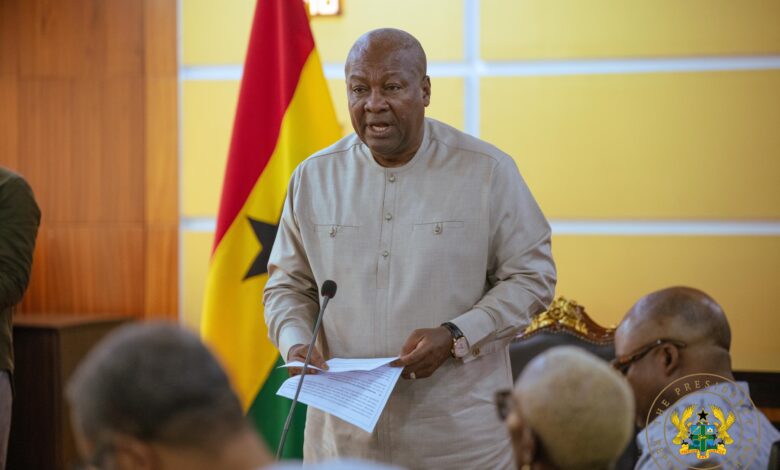
Accra, Ghana – President John Dramani Mahama has inaugurated an 18-member Presidential Advisory Committee on Accelerated Export Development (AEDAC) as part of efforts to significantly expand Ghana’s export base, boost foreign exchange earnings, and accelerate economic growth.
The AEDAC, chaired by President Mahama himself, includes Finance Minister Dr. Cassiel Ato Forson and several distinguished professionals from both the public and private sectors.
Unveiled on Monday, May 5, 2025, at the Jubilee House, the committee is a key pillar of the Mahama administration’s strategy to implement the 24-Hour Economy and reposition Ghana as a competitive player in the global export market.
“The task before this committee is a bold one—transforming Ghana’s export sector to power our 24-Hour Economy, create jobs, and drive sustainable development,” President Mahama said during the ceremony.
The committee is expected to provide strategic direction, foster innovation, and build strong partnerships between government and industry players to enhance value addition, increase non-traditional exports, and diversify export destinations.
Full list of AEDAC members:
1. H.E. John Dramani Mahama – Chairperson
2. Hon. Goosie Tanoh
3. Hon. Dr. Cassiel Ato Forson
4. Hon. Elizabeth Agyare
5. Hon. Emelia Arthur
6. Hon. Eric Opoku
7. Hon. Dominic Ayine
8. Gen. Paul Seidu Tanye-Kulono
9. Anthony Kwasi Sarpong
10. Davies Narh Korboe
11. Dr. Eben Anuwa-Amarh
12. Dr. Akushika Andoh
13. Kwesi Korboe
14. Sampson Asaki Awingobit
15. Representative, Federation of Associations of Ghana Exporters (FAGE)
16. Representative, Association of Ghana Industries (AGI)
17. Jacob Nyarko Mensah – Ghanaian Fashion Industry
18. Gabriel Opoku Asare
The President emphasized that the AEDAC will not be a ceremonial body but an active engine of policy reform, investment promotion, and result-driven export development.
Read the full speech by President Mahama below:
Distinguished guests, esteemed members of the Accelerated Export Development Advisory Committee, members of cabinet, my compatriots, ladies and gentlemen, it’s with a deep sense of duty and national urgency I welcome you all to this momentous occasion, the inauguration of the Accelerated Export Development Advisory Committee.
Today’s inauguration marks a critical step in our collective resolve to transform Ghana’s economy through competitive exports, inclusive industrialization, and purposeful integration into regional and global markets.
Despite its enormous promise, Ghana’s export sector remains constrained by entrenched bottlenecks.
Nearly 47% of Ghanaian exporters report facing serious trade obstacles with non-tariff measures and procedural delays accounting for most of these challenges.
Over 52% of the complaints relate to costly and time-consuming technical regulations and multiple poorly coordinated agency imposing. An exporter may require up to 16 different documentations to obtain a certificate of origin alone.
The Ghana Standards Authority tasked with safeguarding quality is often under-resourced. At the same time, the absence of accredited local laboratories force exporters to rely on foreign testing facilities, raising their costs and causing unnecessary delays.
At our ports, the overlapping inspections, extended clearance times, and informal fees are all a burden for exporters.
According to the International Trade Center, these inefficiencies cost Ghana up to 4.3 billion dollars in lost export revenue each year.
In our fisheries sector, repeated alerts from the European Union concerning illegal fishing, hydrocarbon, and heavy metal contamination have led to temporary bans against our fish exports, and this has come with significant reputational damage.
Alarmingly, women and small and medium enterprises who represent a vital source of innovation and resilience account for less than 4% of Ghana’s exporting capacity.
These are not just statistics, they represent jobs, they represent people, they represent missed opportunities, and delayed prosperity, and we must and will correct this.
It is for this reason that the AEDC has been established to serve as a high level platform for strategic coordination, policy coherence, and institutional accountability in our export development efforts. Our strategy is ambitious but deliberate.
Under the Accelerated Export Development Program Advisory Committee and the National Export Development Strategy, our aim is to grow Ghana’s non-traditional export earnings from 3.5 billion dollars annually to at least 10 billion dollars by 2030.
Ladies and gentlemen, to achieve this, we’ll prioritize value addition and economic diversification. Ghana’s current exports remain dominated by low-complexity raw materials such as gold, cocoa, cashew, timber, all in their raw state.
On the Global Economic Complexity Index, we rank 110 out of 133 countries. This must change. We’ll support our private sector partners to invest in agro-processing and light manufacturing.
In the textiles industry where 75% of inputs are still imported, we must act to decisively harness the potential of a six billion dollar regional market.
Ghana has the potential to substantially increase our exports of garments across Africa and to the world. Through targeted incentives and strategic partnerships, we’ll scale up our local production and participation in this value chain.
Our 24-hour economy strategy will complement this ambition by developing focused value chains in cassava, tomato, palm oil, pharmaceuticals, textiles and garments, and industrial machinery.
With effective implementation, we are confident that by 2034 Ghana can reduce the national unemployment rate from 14.7% as it currently stands to under 5%.
No export strategy can succeed without robust logistics and trade infrastructure. Ghana’s exporters face some of the highest logistics costs in West Africa, and our export clearance times exceeds the regional averages.
We’ll therefore modernize our ports, revamp the Volta Lake Transport Company, develop the Mpakadan Port and operationalize the Boankra Inland Port, and expand the coal chain infrastructure to support our fisheries and horticultural sectors.
These interventions are critical to improving transportation and reducing spoilage, particularly for producers located in the hinterland.
We’ll adopt a digitized export processing system, establish transparent border management protocols, and introduce fast-track inspection to improve efficiency and trust in our trade ecosystem.
The African Continental Free Trade Area provides Ghana with an unprecedented platform to scale. With access to a market of 1.3 billion people and a combined GDP of 3.4 trillion, Ghana must position itself as a regional hub for manufacturing and exports.
As host of the Continental Free Trade Area Secretariat, Ghana must not only participate but lead in this venture.
In 2024, we certified 19 companies under the African Continental Free Trade Rules of Origin framework. In 2025, we will triple this number and expand readiness training for youth and women-led businesses to enable them to trade competitively across the continent.
At the same time, we are diversifying our markets beyond Africa, towards Asia, the Middle East, Latin America, and consolidating our long-standing trade partnership with Europe and North America.
Ghana’s future exports will not only include physical goods, but also digital services, creative content, and knowledge-based products.
To compete globally, we must equip our people. We’ll pursue reforms in vocational and technical education, aligning curricula with the needs of agro-processing, pharmaceuticals, textile manufacturing, and industrial fabrication.
Through programs like the 24-Hour Economy, the Adwumawura Program, the One Million Youth in Coding, and bespoke projects under the Youth Employment Agency, we’ll provide Ghanaian youth with relevant skills for modern industry.
Small and medium enterprises will be supported with technical assistance, expedited certification processes aligned with global standards, and digital market access platforms.
True targeted research and development incentives and scale-up grants will enable Ghanaian enterprises to integrate into global value chains.
We’ll also create a predictable and robust incentive regime, including performance-based tax rebates to drive mass local production and export of made-in-Ghana goods.
Energy reliability will be prioritized through an innovative energy mix strategy, including solar, biogas, natural gas, microgrid turbines, and embedded industrial solutions.
Water infrastructure will be expanded to facilitate year-round industrial productivity and export performance.
My fellow citizens, the global trade environment is evolving, protectionism is rising, and competition is intensifying. We must respond with vision, unity, and determination.
The AEDAC will work closely with the private sector, development partners, academia, and regional institutions to dismantle barriers, identify new export opportunities, and drive coordinated reform.
Supported by the 24-hour Secretariat, AEDAC will partner with GEPA, the Ministry of Trade and Industry, and related agencies to ensure Ghana moves decisively from vision to implementation, from potential to performance. Let us act with purpose and agency.
Let us build a Ghana that earns more than it borrows, a Ghana that processes more than it exports raw, a Ghana that creates jobs through competitive exports and not just slogans.
To the distinguished members of the Accelerated Export Development Advisory Committee, I thank you for accepting this national responsibility. Your work here is going to help shape Ghana’s future.
I therefore have the privilege to declare the Accelerated Export Development Advisory Committee inaugurated. Thank you.
Story by: Emmanuel Romeo Tetteh(#RomeoWrites




